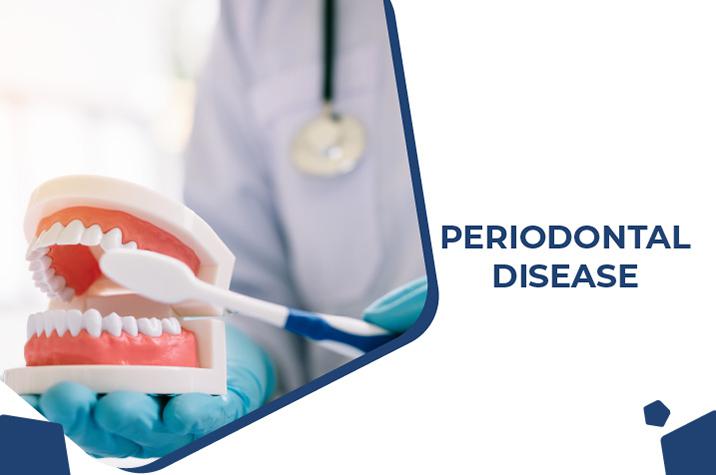Do you have reddish, swollen, and tender gums that bleed when you eat or brush your teeth? If yes, it might be because of underlying gum inflammation, also known as periodontal disease. But don’t worry, you are not alone. According to the US Centers for Disease Control and Prevention, around 47% of adults aged 30 or above suffer from some form of periodontal disease. The good news is that periodontal disease is preventable and completely reversible if diagnosed and managed in the early stages.
This article explains everything you need to know about periodontal disease, from causes to diagnosis, prevention, and management.
What is Periodontal Disease?
According to the American Academy of Periodontology, periodontal disease refers to the inflammation of the gums and tissues surrounding and supporting the teeth in their sockets.
 What Causes Periodontal Disease?
What Causes Periodontal Disease?
Poor oral hygiene is one of the primary causes of gum inflammation. When oral hygiene measures like brushing and flossing are ignored, a thin layer of food debris deposits on the teeth, known as dental plaque. Over time, the plaque hardens and gets converted into calculus. Harmful bacteria utilize the sugars in plaque and calculus for their growth and replication and release toxins that lead to the destruction of the fibers that hold our teeth to the gums and the periodontal tissues.
In the early stages of periodontal disease, the gums appear red and swollen. As the inflammatory process proceeds, destruction of the gum and periodontal fibers results in the formation of gaps or “pockets” between the teeth and the gums, resulting in further food impaction and gum inflammation.
If this situation is not treated timely, the inflammation results in widespread damage to the bone tissue that supports our teeth. As a result, the teeth become mobile, and the bite becomes uneven in advanced stages of periodontal disease. Ultimately, excessive bone resorption leads to tooth loss.
Periodontal Disease and Systemic Health
Gum disease not only affects one’s oral health but can also influence overall general health and wellbeing as well. According to the American Academy of Periodontology, periodontal disease increases the risk of developing heart disease. This is because the harmful bacteria inside the inflamed gums enter the bloodstream and travel to the circulatory system, causing vascular complications such as stroke and heart failure. Besides, long-standing periodontal disease has also been linked with an increased risk of other systemic illnesses such as daibetes, nervous and respiratory problems.
How is Periodontal Disease Treated?
Early-stage periodontal disease can be easily reversed with strict oral hygiene maintenance through regular brushing and flossing. Your dentist Hungtington Beach may also ask you to use a mouthwash that will help in neutralizing the harmful bacteria.
Advanced-stage periodontal disease causes extensive bone loss and gum recession. To treat this problem, your dentist Hungtington Beach will perform a procedure known as professional teeth cleaning. In this procedure, the dentist will use an ultrasonic scaler to remove plaque and tartar deposits from your teeth. In severe bone or gum tissue loss, your dentist Hungtington Beach may need to perform a bone or gum graft procedure. Also, in some cases, you may need to take antibiotics to accelerate the healing process.
Gum disease can not only harm your oral health, but according to the American Dental Association, it can also lead to several general health complications that may even prove to be life-threatening. Fortunately, gum disease can be prevented. Simply maintain good oral hygiene and visit your dentist regularly for checkups. So, book an appointment with Dr. Jason Cellars by calling (714) 848-4247 today and say goodbye to all your dental worries.

